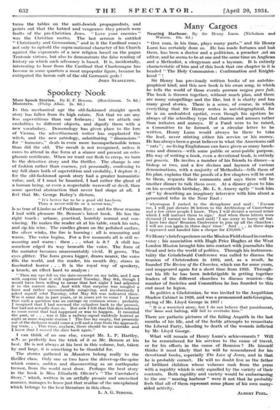Many Cargoes
" ONE man, in his time, plays many parts," and Sir Henry Lunn has certainly done so. He has made fortunes and lost
them, has been a doctor and a politician, a preacher And an editor, and he seems to be at one and the same time an Anglican and a Methodist, a clergyman and a layman. It is entirely characteristic of him and of this book that one chapter in it is headed " The Holy Communion : Confirmation and Knight- hood " !
Sir Henry has previously written books of an autobio- graphical kind, and this new book is his swan song, in which he tells the world of those events quorum magna pars fuit. The book is thrown together, without much plan, and there are many misspellings and the like, but it is chatty and has
many good stories. There is a sense, of course, in which everything that Sir Henry writes is autobiographical, for he is an undoubted egotist, even though his egotism be always of the schoolboy type that charms and amuses rather than irritates and annoys. If a Fund were to be raised, a Committee to be formed, or a circular letter to be written, Henry Lunn would always be there to take the lead, never stinting either his service or his money. He has always been a great believer in what the Americans call
eats"; no living Englishman can have given so many lunch- eons and dinners—with some public or semi-public purpose. His way of writing a book, even a devotional book, is entirely sui generis. He invites a number of his friends to dinner—a
bishop or two, and a few divines and laymen of various denominations, with a majority of MethodistS—telis them of his plan, explains that the proofs of a few chapters will be sent to them, requests their comments and says there will be another dinner to talk them over. At a dinner given to him on his seventieth birthday,. Mr. L. S. Amery aptly " took him off " by describing an imaginary interview with him about a persecuted tribe in the Near East :
" whereupon I rushed to the dictaphone and said : Excuse me, I will just dictate 36 letters to the Archbishop of Canterbury and a few other people I know. Then I will dictate a second letter which I will instruct them to sign.' And when these letters were dictated [I turned to him and said] ' I am sorry to hurry off but I have two days' Reunion Conference to join up all the churches : I will see you again in three days' time.' And . . . in three days I appeared and handed him a cheque for £50,000."
Sir Henry's brief experience on the Mission Field closed in contro- versy : his association with Hugh Price Hughes at the West London Mission brought him into contact with journalists like Stead and into the world of politics. Through his instrumen- tality the Grindelwald Conference was called to discuss the reunion of Christendom in 1892, and, as a result, he
founded The Review of the Churches, which ran for some years, and reappeared again for a short time from 1923. Through-
out his life he has been indefatigable in getting together leaders of the different churches to discuss reunion—the number of Societies and. Committees he_.has founded to this end must be legion.
In politics a Gladstonian, he was invited to the Asquithian Shadow Cabinet in 1926, and was a pronounced anti-Georgian, saying of Mr. Lloyd George in 1917 :
" It is a wretched story, but I do not believe that punishment, tho' lame and halting, will fail to overtake him."
There are pathetic pictures of the failing Asquith in the last
months of his life, and of the feeble attempts to resuscitate the Liberal Party, bleeding to death of the wounds inflicted by Mr. Lloyd George.
What will remain of Henry Lunn's achievements ? Will
he be remembered for his services to the cause of travel, or for his efforts in the cause of Reunion ? He himself thinks it most likely that he will be remembered for his devotional books, especially The Love of Jesus, and in that he is probably correct. He will no doubt live as the father of brilliant children whose volumes rush from the press with a rapidity which is only equalled by the variety of their contents. Both rapidity and variety would be embarrassing to the one " nearing harbour " were it not that he probably
ALBERT PEEL.












































 Previous page
Previous page